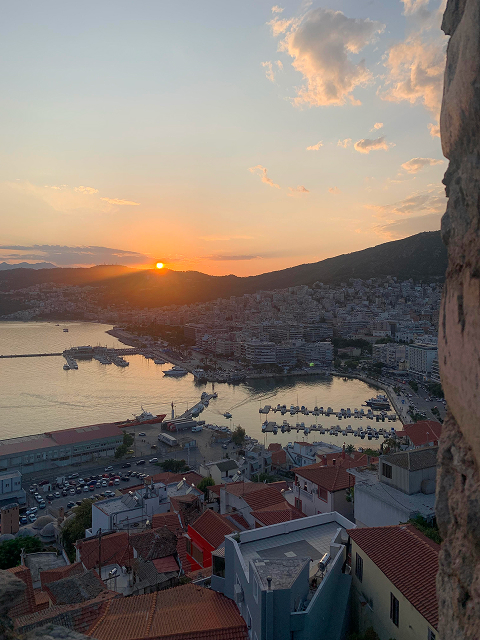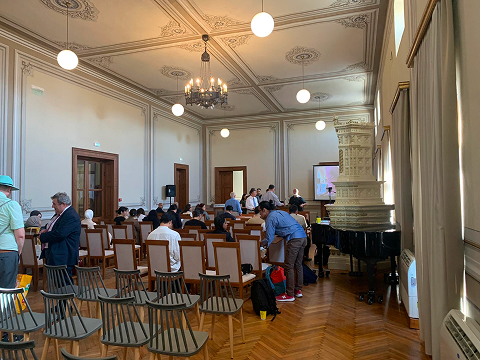2024 Greece
Summer Seminar Report – Kavala , Greece
September 25, 2024
Osaka University Third-year student in the doctoral program
Introduction
In August 2024, following the summer school in Germany, we participated in a summer school in Greece. The entire trip, including relocation days, lasted from August 25 to September 5. I participated in the International Summer School in Kavala, which lasted until August 31.
This summer school focused mainly on the Cyprus issue and the international relations between Greece and Turkey over it. In particular, the geopolitical importance of Cyprus was the focus of discussion.
I will describe the details later, but to be honest, I had some negative impressions of the summer school in Greece. In this report, I would like to honestly describe what I felt and thought about the summer school.

Europe and Non-Europe
The Cyprus issue is a subject that is quite distant from my research subject (modern Japanese philosophy). Therefore, although I had seen that issue in the news, I had never actively researched the historical background of it. Embarrassingly but fortunately, I was able to gain some insight into the Cyprus issue only after participating in this summer school. Also, in my field of study, we do not often have such intensive discussions on a single case, but rather more general discussions. Therefore, the experience of this summer school was very new to me. I felt the importance of learning deeply about a single case study.
To be honest, however, there were some negative impressions of this summer school. That is, the tone of many of the presentations by the Greek participants was to one-sidedly consider Turkey as the aggressor. In my opinion, at least, the focus was not on how to reconcile the Greek and Turkish populations of Cyprus. Those presentations focused on the fact that Greece and the Republic of Cyprus belong to the EU (they are European) and Turkey does not belong to the EU (it is not European), making a clear distinction between the two. It seemed to me, therefore, that the Greek presenters believed that the Cyprus issue should be resolved under the EU legal system and that it was not necessary to accept Turkey’s arguments.
This impression was given not only by the arguments themselves, but also by their choice of terminology. I remember one presenter from Greece repeatedly referring to the geopolitical issues surrounding Cyprus in terms of “European reality.” The use of this word seemed to me to shut out the claims of Turkey (which, as noted earlier, is considered non-European) from the Cyprus issue and to promote the representation of Turkey as an aggressor coming from outside of Europe.
The Invisible Darkness of the Past
By the way, in my opinion, to my delight, the presentations by professors from Waseda University, Jena University, and other universities seemed to raise questions and objections to the general tone of the summer school. I would like to introduce some of them.
Prof. Umemori Naoyuki of Waseda University concluded his presentation by asking the question, “What should be remembered and forgotten for the sake of reconciliation in Cyprus?” in the context of the mutual victimization of Greek Cypriots and Turkish Cypriots by each other. My impression was that this question was very important because it cast doubt on the one-sided tone of this summer school.
However, Prof. Umemori’s presentation was ended with no time for Q&A. It is true that the first presenter of the day exceeded his time, which delayed the start of Prof. Umemori’s presentation. However, I could not help but be disappointed by the lack of a Q&A session.
I would like to mention one more presentation by Dr. Charalampos Babis Karpouchtsis. Dr. Karpouchtsis’s presentation exceeded my expectations: he addressed the claims of both sides, facing the fact that not only Greek Cypriots were victimized by the Turkish side, but also Turkish Cypriots were victimized by the Greek side. He also pointed out that both sides were remembering only the memory of the damage as a priority and were blind to the memory of their own aggression. This was an extremely important point, and one that resonated with the question posed by Prof. Umemori. Dr. Karpouchtsis’s presentation clearly showed his stance of starting reconciliation from consideration of how to face the darkness of the past, which has become invisible.
Summer School as a Case Study
On the morning of August 29, there was a meeting solely for participants from Waseda University’s International Reconciliation Studies Project to exchange opinions about this summer school. One participant’s opinion left a strong impression on me. The participant said, “We should consider reconciliation using this summer school itself as a case study.” I would like to write down my own thoughts on this opinion.
As I mentioned earlier, the tone of this summer school was to view the Cyprus issue only from the Greek side. This tone seemed to contain a desire to clearly separate Greece as Europe from Turkey as non-Europe and to strengthen its own identity. Perhaps this desire does not only exist among some Greeks who are committed to the Cyprus issue. Such a desire may be found in many other instances of conflict.
I believe that reconciliation studies need to analyze how this desire itself is constituted. I have come to the above conclusion as a result of my own response to the opinion that “we should consider reconciliation using this summer school itself as a case study.”

By the way, this summer school allowed me to meet some great members with such critical perspectives. I am very happy about this.
However, I have a few regrets. One of them is that I could not join the last part of the trip. After I left Greece, Prof. Umemori told me that he had a chance to talk with some Greek Muslims. I think this would have been an important opportunity for me to gain new insights. If I may say so, I think that the learning in this summer school would not have been complete without that opportunity.
Another thing is that due to my schedule, I could not attend the presentations of young researchers in Greece. I am very disappointed because I have felt the sharpness of their insights through our interactions during the summer school. I would like to continue to actively participate in meetings in Japan, International Association for Reconciliation Studies, and the summer school, and to listen to the presentations of young researchers.

